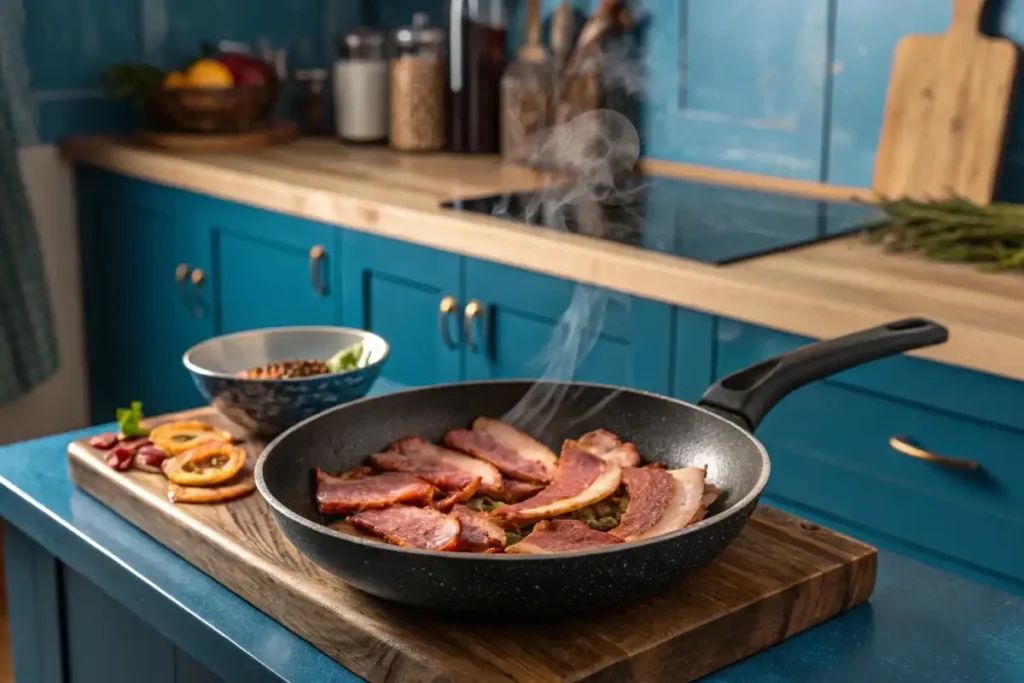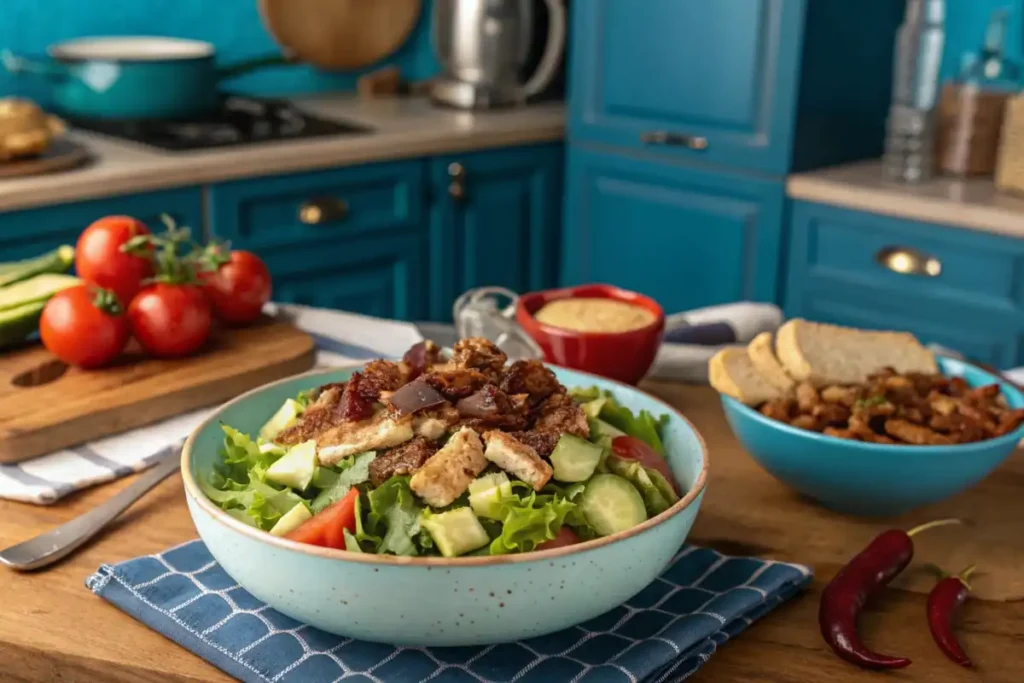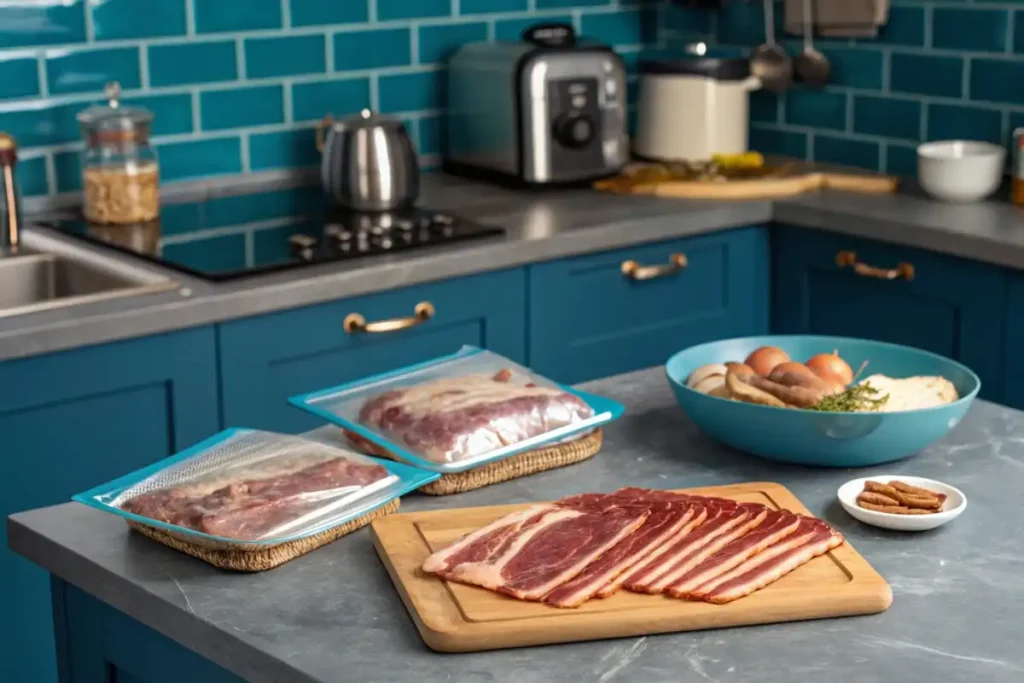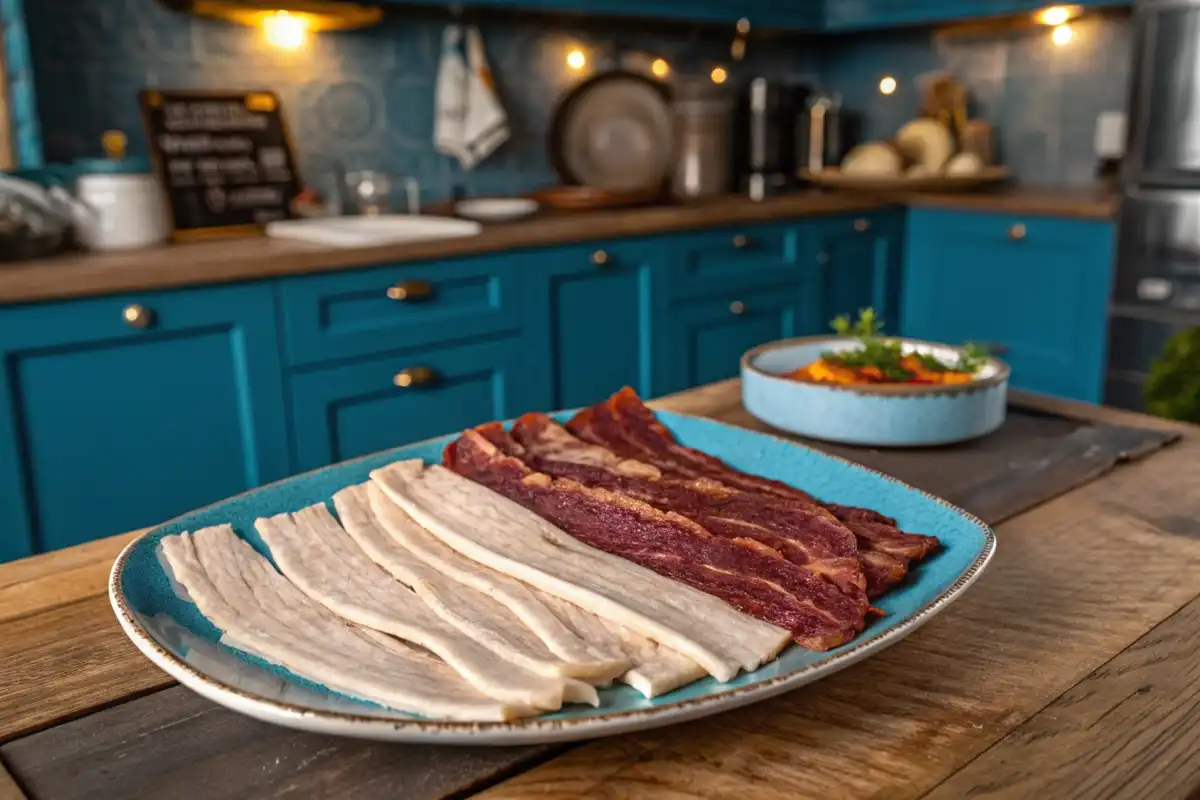Understanding the Buzz
At the present time, many Americans find themselves curious about new breakfast options. Which is better, turkey or beef bacon? This question pops up in kitchens where people crave flavorful, crispy strips without certain traditional choices. In contrast to older preferences, these two lean alternatives bring unique textures and tastes. Because more shoppers want variety, understanding the differences matters.
Furthermore, health-conscious individuals often look for options that align with wellness goals. Therefore, comparing turkey and beef strips can help guide your shopping list. In addition, exploring cooking methods, flavor profiles, and nutrition ensures informed decisions. Eventually, you may discover a favorite that fits your morning routine perfectly.
In the meantime, let’s dive in. We will break down nutrition, cooking tips, and even taste tests. To sum up, knowing which is better, turkey or beef bacon? can lead to tastier meals and happier mornings.
Before We Begin: Setting the Scene
Think of it like a friendly face-off. On one side, we have turkey bacon—light, lean, and sometimes preferred for its subtle flavor. On the other side, we have beef bacon—richer, meaty, and appealing to those who want a heartier bite. Both offer crisp textures and smoky aromas. Because each has loyal fans, understanding their differences clarifies which might suit your palate.
At the same time, remember that personal taste plays a big role. In addition, factors like cooking styles and dietary restrictions influence your choice. Eventually, you’ll find that exploring both can broaden your breakfast horizons.
The Main Question: Which Is Better, Turkey or Beef Bacon?
Which is better, turkey or beef bacon? The answer depends on what you value most. For instance, do you prefer milder flavors or do you crave bold, beefy notes? Are you watching your calorie intake, or do you want a protein-packed punch? Because everyone’s priorities differ, breaking it down category by category helps.
In contrast to guessing, we’ll examine important points:
- Flavor and texture
- Nutritional differences
- Cooking techniques
- Dietary considerations
- Availability and price
Let’s explore each aspect in detail.
Flavor Profiles: Crisp and Savory Differences
Turkey Bacon Taste
Turkey bacon often delivers a lighter taste. Because it’s made from turkey meat processed into strips, it usually carries mild smoky undertones. In addition, turkey strips may have a slightly firmer texture. Although they crisp up well, they tend to feel a bit leaner and less oily. Therefore, those who prefer subtle flavors may appreciate turkey’s gentle character.
Beef Bacon Taste
Beef bacon, on the other hand, offers a richer flavor. Because it comes from beef cuts—often cured and smoked—it provides a deeper, meatier taste. In addition, these strips can feel more robust on the palate. To demonstrate, imagine a heartier chew with a savory depth that complements hearty breakfasts. In contrast to turkey bacon’s gentle approach, beef bacon shouts its presence with boldness.
Nutritional Breakdown: A Look Under the Hood
When deciding which is better, turkey or beef bacon? nutrition often comes into play. At the present time, health considerations guide many food choices. Therefore, comparing their nutritional profiles can help you pick the option that supports your lifestyle.
Below is a sample nutrition table (approximate values per two slices, about 28 g):
| Nutrient | Turkey Bacon (2 slices) | Beef Bacon (2 slices) |
|---|---|---|
| Calories | ~60 kcal | ~90 kcal |
| Protein | ~4 g | ~6 g |
| Total Fat | ~3.5 g | ~6 g |
| Saturated Fat | ~1 g | ~2.5 g |
| Carbohydrates | ~0.5 g | ~1 g |
| Sodium | ~240 mg | ~190 mg |
| Iron | ~1% DV | ~2% DV |
| Zinc | ~2% DV | ~4% DV |
(Note: Values vary by brand and preparation.)
In addition, consider that turkey bacon tends to have fewer calories and slightly less fat. However, beef bacon provides more protein and sometimes lower sodium depending on the brand. Therefore, your choice may hinge on your nutritional goals. For instance, if you aim to cut calories, turkey might appeal. In contrast, if you value a protein boost, beef may seem better.
Dietary Considerations: Aligning with Your Needs
At the present time, people follow diverse dietary patterns. Some count macros, while others focus on quality protein or sodium intake. Because turkey bacon often touts lower calorie content, it can fit into leaner meal plans. For example, those who want a lighter breakfast might choose turkey strips for fewer calories.
In contrast, beef bacon might attract those who crave a meaty flavor without certain ingredients found in other options. Furthermore, if you aim to increase iron or zinc intake, beef bacon offers slightly more of these minerals. Eventually, balancing your nutritional goals with flavor preferences leads you to pick a winner.
Cooking Techniques: Making Each Strip Shine
Which is better, turkey or beef bacon? Sometimes the answer depends on how you cook them. Because cooking can enhance or diminish natural flavors, it matters.

Cooking Turkey Bacon
- Pan-Frying: Cook on medium heat, flipping often. Turkey strips crisp fast. Avoid high heat to prevent dryness.
- Baking: Line a sheet with parchment, arrange turkey strips, and bake at about 375°F (190°C) until crisp. This method reduces hands-on time.
- Microwaving: Quick and convenient, but watch timing to prevent rubbery texture.
Cooking Beef Bacon
- Pan-Frying: Use medium heat. Because beef has a bit more fat, it can render well, creating crispy edges. Drain on a paper towel to remove excess grease.
- Baking: Place strips on a rack over a sheet tray. Bake at about 400°F (204°C) until crispy. This allows fat to drip away.
- Grilling: Yes, you can grill beef bacon. This adds smoky notes and a slight char.
In addition, consider experimenting. For instance, try mixing turkey and beef strips in the same meal. However, keep track of cooking times since their textures differ. Eventually, you’ll develop a preferred method.
Availability and Price: Finding Your Favorite
At the present time, turkey bacon is widely available in most U.S. grocery stores. Beef bacon, while not rare, can be slightly harder to find, depending on your region. Because demand influences availability, you might need to check specialty markets or online retailers for beef bacon.
In addition, prices vary. Turkey bacon often comes in more budget-friendly packages. In contrast, beef bacon might cost a bit more, reflecting its production process and sourcing. Therefore, if affordability guides you, turkey bacon might edge ahead. However, if you crave a unique treat, investing in beef bacon could be worthwhile.
Pairing Suggestions: Perfect Partners for Each Type
So, which is better, turkey or beef bacon? Sometimes it depends on what else you’re serving. Let’s consider pairing ideas.

Turkey Bacon Pairings
- Fresh Fruit: Pair the lighter flavor with a bowl of melon or berries.
- Whole-Grain Toast: Add a slice of whole-grain toast with avocado for extra fiber.
- Veggie Omelet: Turkey’s mild taste complements a veggie-packed omelet.
Beef Bacon Pairings
- Hearty Oatmeal: The richer strips contrast nicely with a bowl of savory oatmeal.
- Tomato and Lettuce Wrap: Add sliced tomatoes, lettuce, and perhaps a slice of cheese.
- Grain Bowl: Toss chopped beef strips into a quinoa or brown rice bowl loaded with greens.
In addition, consider trying each option with different sauces or dips. For instance, a light yogurt dip might brighten turkey bacon, while a smoky sauce could complement beef strips.
A Quick Laugh to Brighten Your Morning
Joke Time:
Why did the breakfast strip join the debate team?
Because it wanted to settle once and for all which is better, turkey or beef bacon? It kept “stripping” away at the arguments, hoping to crisp up the competition!
(Okay, that was a bit “corny,” but who doesn’t love a cheesy food joke now and then?)
The Health Factor: Beyond Just Calories
When pondering which is better, turkey or beef bacon? it’s not only about numbers. In addition, consider quality. For instance, check if the product uses natural seasonings and fewer additives. Furthermore, look for brands that focus on humane sourcing and minimal processing.
At the present time, many health-oriented consumers care about transparency. Therefore, read labels, compare ingredients, and choose brands that align with your values. Eventually, picking a product that tastes good and feels good matters more than just calorie counts.
Texture Matters: Crunch and Chew
Texture can shape your breakfast experience. Because turkey bacon often carries less fat, it can feel firmer and crisper. In contrast, beef bacon, with a bit more fat, may provide a slightly richer mouthfeel. This means a bit of chew and a satisfying snap.
If you love the crunch, turkey might win. If you prefer a hearty chew, beef steps into the spotlight. In addition, cooking methods alter texture. For instance, baking either type results in even crisping. Experimentation helps refine your preference.
Smoke and Seasonings: Flavor Variations
Producers often add smoky flavors and seasonings to turkey and beef strips. Therefore, brand choice matters. Some turkey versions might taste milder, while others incorporate robust smoke. Similarly, beef bacon can range from lightly seasoned to deeply infused with spice.
In contrast, generic brands may taste plainer. High-quality brands might use applewood smoke or special herb blends. Because these variations exist, try a few products before deciding which is better, turkey or beef bacon? You might find that a specific brand’s seasoning tips the scales.
Cooking Tips for Perfection
To enhance whichever you choose, consider a few cooking tricks:
- Low and Slow for Tenderness: If you prefer less crispness, cook at a slightly lower temperature. This helps maintain moisture.
- Paper Towel Draining: Always pat your strips with a paper towel after cooking. This removes excess oil and ensures a leaner bite.
- Mixing It Up: Consider blending turkey and beef strips in dishes. For example, add chopped pieces into a frittata to enjoy a flavor combo that satisfies both mild and bold palates.

Popular Diet Trends and Their Influence
Many consumers follow diets like keto, paleo, or just balanced eating. Because these diets emphasize protein and often moderate carbs, turkey or beef strips can fit in. Turkey bacon, with fewer calories, might align well with calorie-conscious dieters. Meanwhile, beef bacon’s richer protein content might appeal to strength trainers or those seeking more nutrients per bite.
In addition, turkey bacon might pair nicely with veggie-packed breakfasts for a lighter start. Meanwhile, beef bacon might complement heartier breakfasts with eggs and leafy greens. Eventually, your diet type helps determine your winner.
Storage and Shelf Life
To decide which is better, turkey or beef bacon? consider storage. At the present time, both types typically come vacuum-sealed. Store unopened packages in the refrigerator and use by the date on the label. Once opened, wrap leftover strips tightly and refrigerate, using them within a few days.
If you want to freeze them, ensure airtight packaging. Because turkey bacon is leaner, it may freeze and thaw with minimal texture change. Beef bacon, with its marbling, can handle freezing as well, though the fat content may influence texture. In any case, proper storage maintains quality and flavor.
Cooking Light or Rich: You Decide
Think about your mornings. Do you want a quick, lean boost? Or do you crave a robust start that keeps you satisfied longer? Turkey bacon can feel light and refreshing, pairing easily with fresh fruits or a yogurt parfait. In contrast, beef bacon can anchor a heartier meal, keeping you full for hours.
Because both options have merit, try rotating them. One week, focus on turkey bacon to enjoy a lighter touch. The next week, try beef bacon for a more indulgent experience. Eventually, variety keeps your meals exciting and prevents monotony.
FAQ Section: Answering Common Questions
Q: Can I find low-sodium versions of turkey or beef bacon?
A: Yes, many brands offer reduced-sodium options. In addition, carefully reading labels and choosing reputable producers helps.
Q: Which is better, turkey or beef bacon?
A: It depends on your goals. Turkey bacon is often leaner with fewer calories. In contrast, beef bacon offers richer flavor and slightly more protein. Therefore, it comes down to personal preference and dietary priorities.
Q: Are both types gluten-free?
A: Generally, turkey and beef bacon are gluten-free if not flavored with gluten-containing additives. However, always check the ingredient list to be sure.
Q: Can I cook them together?
A: Yes, but monitor cooking times. Turkey bacon might finish quicker, so adjust to prevent overcooking one type while waiting for the other.
Q: Are these products suitable for special diets, like low-carb plans?
A: Both turkey and beef bacon fit into many low-carb diets, especially when paired with nutrient-dense foods. Check macros if you’re tracking specific goals.
Q: What is beef bacon made of?
Beef bacon is made from beef, specifically the belly or brisket cuts of the cow. These cuts are cured, smoked, and sliced in a manner similar to traditional pork bacon, offering a similar taste and texture with a beefy twist…
Q: Is beef bacon healthier?
🥩Beef bacon is often considered a healthier alternative to pork bacon because it generally contains less fat and fewer calories, depending on the cut. However, it is still a processed meat and can be high in sodium, so moderation is key for a balanced diet…
Q: Can Muslims eat beef bacon?
Yes, Muslims can eat 🥩beef bacon as long as it is prepared in accordance with Islamic dietary laws (Halal). This means the beef must be sourced and processed in a Halal-certified manner…
Conclusion: Which Is Better, Turkey or Beef Bacon? Making the Final Call
Which is better, turkey or beef bacon? In conclusion, there is no one-size-fits-all answer. Turkey bacon shines when you want a leaner option with fewer calories. It offers a subtle flavor that pairs well with light and fresh breakfasts. In contrast, beef bacon stands out when you crave robust, meaty flavor and a bit more protein. Its bold taste can elevate heartier dishes.
At the end of the day, your choice depends on your goals and palate. Therefore, consider experimenting. Try turkey bacon for a week, then switch to beef bacon. Compare how you feel after each meal. Eventually, you may find that you enjoy having both options at different times. In the meantime, exploring and taste-testing can lead you to your perfect breakfast match.
